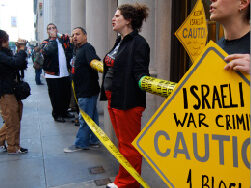

Our yearly Seder took went really well with about 150 people in attendance. TheSeder is a time when we are able to bring together Jewish spirituality withAnti-Zionist values by drawing parallels between the historyof Jews leaving an oppressive Egyptto the current struggle of the Palestinian people. There were a lot ofpeople new to IJAN. People seemed to really enjoy it and once again it playedan important role in providing a space for people to come together. It was alsosuccessful in raising money to go towards the cost of the Assembly of Jews andthe Maia Project of the Middle East Children’s Alliance.

So, it came as a surprise when, at 11:30 on that first Saturday night, after an exhausting opening session, about a quarter of the 200 conference-goers, overwhelmingly under 30, gathered to celebrate havdalah, the ceremony that ushers out the Sabbath. As they swayed in a circle singing “Lo Yisa Goy,” a Hebrew folksong—“and into plowshares beat their swords, nations shall learn war no more”—the International Jewish Anti-Zionist Network felt for a moment like Jewish summer camp. Many Jewish community leaders would not have been enthusiastic about the scene. And, in echoes that reverberated throughout the conference, neither were some leaders of the Jewish Anti-Zionist Network.
A growing cohort of young Jews actively involved in Jewish life—often in alternative realms like independent minyans, the Yiddish-revival movement, and social-justice organizations—are taking left-wing positions on Israel that leave them feeling marginalized even in the Jewish communities they call home. Ideologically, they range from those who couch their politics in the language of international law and ultimately favor a two-state solution to those who use the more radical language of anti-imperialism and insist that true democracy can never happen within a Jewish state—with countless shades in between. By flirting with the labels “non-Zionist” and “anti-Zionist” without abandoning other traditional affiliations, they have crossed a line into territory where there exists no well-marked space on the American Jewish ideological map.
Into this vacuum came the first conference of the two-year-old International Jewish Anti-Zionist Network, a still-obscure organization (though one now on the watch list of some mainstream Jewish organizations) with a moniker echoing those of long-defunct groups, like the Jewish Communist Labor Bund, that tethered Jewish specificity to the international left. For many of the young Jews who turned out in Detroit—most en route to the U.S. Social Forum, a major activist expo that was held in the city later that week—the Assembly seemed to promise a distinctly Jewish space in which to engage in or try on the ideas that Zionism does in fact equal racism and that only a one-state solution can mean justice for Palestinians—regardless of whether they take such a hard line in their day-to-day lives.
Read more

Contributingto the heroic Palestinian Resistance, this growing awareness willincidentally precipitate the abolition of the Zionist ideology and itshideous manifestation, just like slavery or Nazism were abolished.
ThePalestinian Resistance and its allies represent an exemplary model ofdiversity and cooperation across borders, race, age, economiccircumstances, religion or nationality.
In essence, the Palestinian Resistance is a model of inclusion, the radical contrary of the exclusivist Zionist ideology.
Contrary to the gory Zionist project, our true and sincere aspirations are long lasting Peace, Justice and Freedom. For us, this will restore of the true foundations of Palestinian society.
Afteralmost a century of unrepentant Zionist terrorism in Palestine, alldoubts have vanished: The only real road to Peace is a full andunconditional Liberation of Palestine, liberation from thissupremacist ideology and liberation from the perpetrators. That willinevitably mean a return to the original, peaceful society Palestinewas before the Zionist invasion.

CONTACT
FOLLOW US
SUBSCRIBE TO OUR NEWSLETTER
BUSINESS OF BACKLASH
Click here to download the 120-report which exposes the funders of Zionist backlash on campuses and in communities
SEARCH THE SITE
NAVIGATION
WHO WE ARE
NEWS & OPINIONS
PROJECTS & CAMPAIGNS
CHAPTERS & SECTORS
RESOURCES
GET INVOLVED

